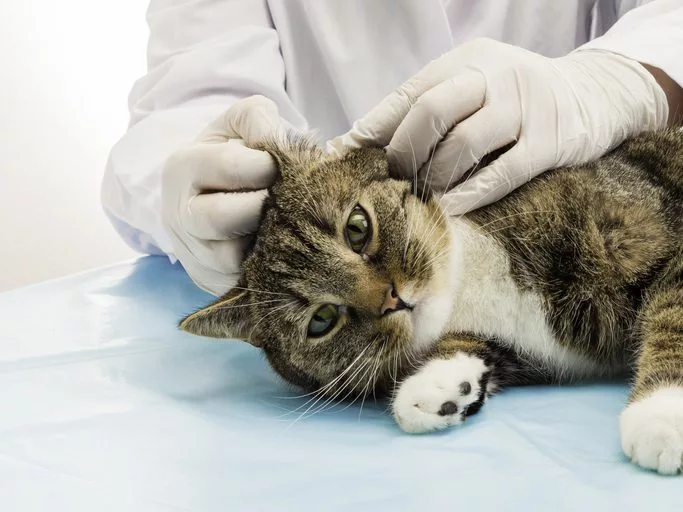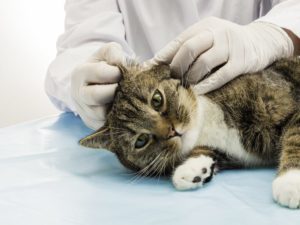Why Does My Cat Keep Throwing Up in Santa Clarita, CA?

Cats are known for being prone to vomiting, and some breeds of cats are more likely to have touchy stomachs than others. That being said, there are some instances where cat vomiting is excessive and can be a cause for concern. If your cat is throwing up frequently, there are some common reasons that this might be the case, and you might need to make some adjustments to their routine or diet to improve this situation.
In other instances, vomiting all the time can be related to health conditions that need medical attention. Your vet can help you to get to the root of the reason for your cat vomiting all the time and make sure that you are giving them the support that they need to feel their best every day.
6 Common Reasons That Cats Vomit
If you are ready to find out why your cat is throwing up all the time, you need to keep reading!
1. Hairballs
When cats groom, they ingest their own hair. This hair can clump up in their stomach and then need to be expelled. There are some breeds of cats that are more prone to hairballs than others, and long-haired cats might frequently need to expel hairballs to be healthy.
When your cat is throwing up hairballs all the time, you can change their diet to a hairball prevention food, and you can also dose them with a medication that helps break up hairballs so that they can pass through the digestive tract. Older cats might be more prone to this condition as well, and you might need to take your cat to the veterinarian to get them started on a hairball preventative that will deliver better results than over-the-counter medications.
2. Eating Too Fast
Some cats, particularly cats that have been strays, can bolt their food or eat much too fast. This can lead to undigested food clumping up in their stomach, which must be thrown up. You can help stop this behavior by getting a food bowl that is made to slow down eating or by feeding many small meals throughout the day.
If your cat bolts its food due to competing with other cats in the house for food, make sure to offer food in various locations of the home. This will prevent competition and fighting over food and make sure that your cat is not eating so fast that they make themselves sick.
3. Allergies
Cats can have food allergies just like people. Some cats cannot eat kibble food and have to switch to a raw diet. There are also allergy-friendly foods on the market that are made to prevent this kind of issue.
Your vet can help you to find the right allergy-friendly feeding protocol for your cat so that they are not getting sick after each meal. It is important to address this issue right away so that your cat does not get dehydrated or end up going into kidney failure due to exposure to allergens on a daily basis.
4. Poisoning
While not common, sometimes cats can get into things that they should not eat. Outdoor cats might eat things like rat poison, or they might eat rodents or other items that have been lying around for a while and are rotten. When cast get poisoned like this, they will need to see the veterinarian in most cases.
Cats cannot vomit for too many hours without risk to their health. You will want to make sure that your cat gets IV fluids, some anti-nausea medication, and medications to prevent the spread of a toxin through their body.
5. Kidney Failure
Kidney failure is more common in older cats, but some young cats can suffer from this condition as well. Kidney failure can lead to your cat vomiting, lethargy, and lack of appetite, as well as excessive drinking and urination. There are some options to help cats with this condition, such as an altered kidney-friendly diet and even dialysis.
You will want to take your cat to the vet if they are showing the above symptoms and seem to be feeling poorly every day. Catching kidney failure early can make a big difference in the treatment process for this disease. While there are not as many options for treatment as there are for humans, some cats can enjoy a long and healthy life even with kidney failure.
6. Parasites
Cats can get worms and parasites that make them vomit, and you will need to take your cat to the vet if they have also lost weight or their coat is dull. Parasites can make your cat very sick, and one of the earliest symptoms might be vomiting.
Thankfully, this condition is really easy to treat, especially when diagnosed early. If you have an outdoor cat or a cat that spends time outdoors most of the day, you will want to rule out this reason for their vomiting with help from the vet. There are simple ways to prevent parasites in your outdoor pets, and your vet can give you the right medications to keep parasites and worms at bay.
Cats Vomiting Can be Serious is Left Untreated
Cats are not very good at recovering from bouts of vomiting, so you will want to be sure that you take the time to diagnose the reason for their vomiting. Throwing up once in a while is normal enough, but bloody vomit or repeated vomiting is never normal and needs attention from a vet. Once you have isolated the reason for your cat’s vomiting, you can help them to feel better and to enjoy a healthier life every day.
Vomiting in cats can be breed-specific, but it is more often related to food, environmental conditions, or health concerns. Make sure that you take note of when your cat is vomiting and get the help of a vet right away if you think that your cat is showing other signs of distress. Preventing dehydration in cats is important, and you will want to attend to vomiting before your cat’s organs become distressed.
Reach out to your vet at Stevenson Ranch Veterinary Center by calling (661) 799-0655 or booking an appointment online to make sure your cat’s vomiting is treated soon!
Check Your Pet's Records
Look no further, PetDesk allows you to view your Pet's Health information, appointment reminders, etc.
Let's Go Shopping
Need a refill on vitamins, food, etc for your pet? Check our our online store.
Book an Appointment
Looking for Veterinary Care? Stevenson Ranch is a place that you can your pet can depend on for exceptional care.

